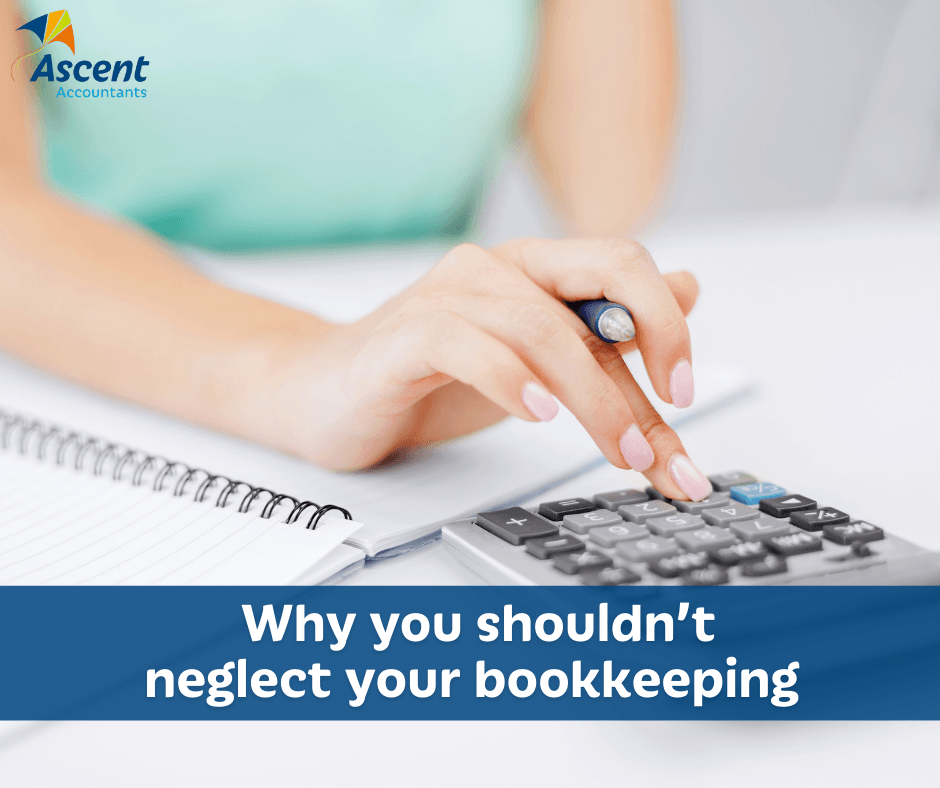Why you shouldn’t neglect your bookkeeping

Missed opportunities
Information is power and is such an important part of owning a business. You need to be as clued up as possible about the inner workings of your business, which includes knowing about things like how the business is performing, your financial state, accounts requiring reconciliation, and so on. Without having all this information, you aren’t able to make smart and educated decisions for your business.
If you do not have access to things like a cashflow forecast it can be really hard to know whether you can afford to hire new employees or buy much needed equipment. There are very high levels of risk that come with making decisions when you’re misinformed about your business or don’t have all the information.
Having a good system and using good accounting software can give you access to information about your business in real time, allowing you to make well informed business decisions.
Cashflow problems
Bookkeeping is so important when it comes to tracking your receivables. You need to know where and when money is coming into your business and going out.
This can help when it comes to knowing who has received an invoice, who has an outstanding invoice, and when they are paying. It can also help when it comes to knowing when you need to chase up any unpaid invoices.
Some customers may not need to know when they are required to pay until they receive an invoice, and others may not pay until you chase them up. Either way, you want to be on top of things and be proactive as possible. Following up unpaid accounts can quickly spiral out of control and cost your business a lot of money if you do not have a handle on it.
If you are neglecting your bookkeeping, this can also lead you into problems with paying off debts or paying your suppliers. This can really damage the relationships you have built and may cause problems later on.
Who is required to pay?
GST is super important and it plays a vital role in our society to help fund, build and support our communities.
You need to register for GST if you run a business or enterprise that has an annual turnover of $75,000 or more. If your business is a not for profit then that annual turnover moves up to being $150,000 before you are required to register and pay GST.
One other special case if you’re a taxi or rideshare driver. If this is the case, then you are required to register and pay GST regardless of your total annual income.
Payroll mess ups
Your staff are the people that keep our business going – you really do not want to be letting them down when it comes to paying them correctly and on time.
A big part of bookkeeping is keeping track of payroll. If this is not done correctly, the flow-on effect can lead to a lot of problems for your business. Problems include failure to collect the correct taxes, overpaying employees who may not report being overpaid, or you could even have to rush payments to employees.
Mistakes such as these can have a big impact on your business. Not only will it strain your relationship with your staff, but it could also open you up to fines from the government for failing to pay the correct taxes and superannuation.
Money borrowing problems
At some point, it’s very possible that your business will need financing from a bank or financial institution. In order to get a loan from one of these places, you are required to provide up to date records to show how your business is performing. Without these accurate records, banks may not trust you, making it far more difficult for you to find the right line of credit for your business. If they do provide you with a loan without these, it may be under unfavourable conditions.
Neglecting your bookkeeping can also make it easy to miss repayments or force you to make late payments. This can damage your credit score, making it harder again to raise money for your business. It’s a bit of a vicious cycle.
If you decide to look to raise money from investors, they will also ask for detailed financial records. Lacking this data could cause you to lose their interest and could damage your professional reputation.
Extra costs
Not having accurate and up to date record keeping could cost your business in extra accounting fees because of the extra work involved. You also may incur Tax Office late fees for late lodgement of forms and returns.
Bookkeeping is such an important part of any business. It affects so many different aspects which can either make your business easier or harder to run. Do yourself a favour and give your bookkeeping some extra love, even if that means outsourcing. Everyone, including yourself, will thank you for it! If you want to discuss this further or enquire about your bookkeeping service, please contact 08 6336 6200
Need help with your accounting?








